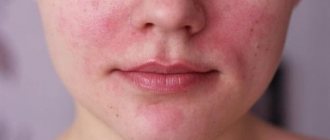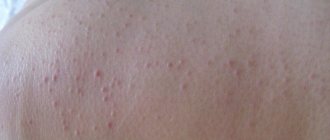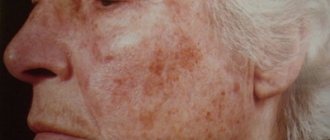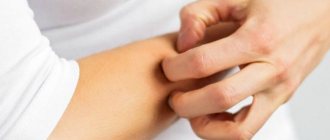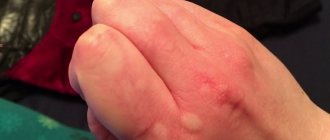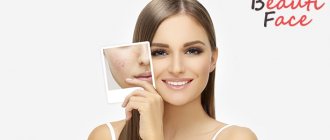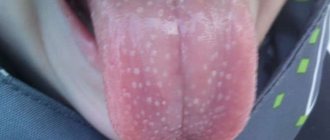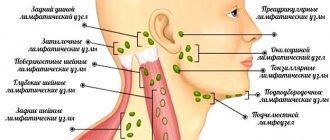Itchy wrists
The skin on the wrists is very thin and delicate. In addition, this area of the body, like the hands, can come into contact with cleaning agents or detergents, as well as be exposed to cold air in the winter. A fairly common cause of itching and redness on the wrist is contact dermatitis, or exposure to cold. There are also many different signs from the category, for example: what to expect if your wrist itches? Next, let's try to understand these issues in a little more detail!
Provoking factors and causes of itching on the hands
The following unfavorable factors have a negative impact and cause itching of the skin of the hands:
- sunburn, hypothermia, chapping;
- incorrect selection of detergents;
- using a cream that causes allergies;
- exposure to chemical irritants at work or at home:
- wearing synthetic clothing;
- nervous tension;
- avitaminosis;
- allergic reactions to food, medications.
If the provoking factors are eliminated, your hands will stop itching. There are a number of diseases in which itching is an accompanying symptom. These include:
- eczema, dermatitis, psoriasis, scabies;
- allergy;
- failure of the endocrine system;
- renal failure;
- diabetes;
- cirrhosis of the liver;
- vegetative-vascular dystonia.
With these diseases, there is itching of the palms and the outside of the hands. May appear on the elbows and forearms. To eliminate unpleasant manifestations, you need to contact a dermatologist, therapist or other specialized specialists.
Possible reasons
The main causes of itching on the wrists:
- Allergic reactions;
- Mechanical impact;
- Temperature effect;
- Skin diseases;
- Disruption of internal organs.
Allergies are a common cause of itching
Allergic reactions to chemicals, food and components of body and hair care products are one of the most common causes of discomfort. The effect of allergens on the body is in some cases accompanied by an intense reaction of the skin and mucous membranes.
Individual intolerance to certain chemical ingredients leads to painful reactions of some users to traditional foods and popular shampoos that do not cause any harm to other consumers.
Allergies can manifest themselves to various substances:
- Detergents (washing powders, toilet soap, shower gels, shampoos, as well as all kinds of household chemicals);
- Food products (citrus fruits, strawberries, seafood, chocolate, all kinds of preservatives and food coloring);
- Cosmetics (ointments, creams and components of decorative cosmetics).
Allergic reactions manifest themselves in the form of severe itching, in which the arms, legs and other parts of the body begin to itch. Other manifestations of allergies: rashes on the skin of the hands, various swellings, red spots and water blisters. Successful elimination of painful symptoms is possible only when the allergen is detected and the source of irritation is completely removed. Professional consultations with a doctor help you select the antihistamines necessary to suppress acute allergic reactions.
Mechanical and temperature effects
Delicate skin reacts painfully to regular mechanical impacts from synthetic fabrics or fur products. Microscopic scratches, open to temperature and chemical influences, provoke the progression of itching and discomfort. The situation is aggravated by the combined influence of several factors.
For example, in the cold season, the wrists experience temperature effects from frosty air and mechanical effects from the hard sleeves of some types of outerwear, hardened by the cold. No less dangerous for skin health is prolonged exposure to cold without mittens or gloves. With this regimen, the skin on the hands becomes severely cracked and painfully itchy, causing severe pain and limiting normal activities.
The appearance of scratches on dry and chapped skin leads to an aggravation of the problem and the desire to scratch the affected areas of the skin. It is necessary to protect sensitive parts of the hands as much as possible from exposure to frosty air. The right choice of winter gloves provides soft protection for sensitive areas of the body exposed to atmospheric factors.
It is advisable to additionally use a nourishing cream that saturates dry skin and gives it the ability to resist the influence of negative atmospheric factors.
The cause of skin irritation can be canvas work gloves during long hours of professional work in conditions of elevated temperature and extreme dustiness of industrial premises. Careful hygiene will minimize the risk of skin irritation. Increased sweating at high temperatures in industrial premises is an additional risk factor leading to skin problems.
One of the reasons why itching on the wrists appears is the failure to use special protective equipment when working with chemically active solutions. If you experience symptoms of allergic reactions to chemicals despite following standard precautions, you should definitely consult a doctor to determine the cause of the complications and develop an effective course of treatment.
Skin diseases
The wrists itch due to skin diseases (eczema, psoriasis, scabies, lichen and fungus). A visit to a specialized specialist helps with a high degree of confidence to exclude the presence of dangerous infectious diseases, as well as to select the optimal course of treatment that helps get rid of the causes and external symptoms. The infection cannot be ignored, since treatment of advanced problems is always difficult and involves the need for long-term quarantine, which excludes the possibility of normal activities.
One of the causes of itching is scabies (a dangerous infectious and contagious disease). Scabies can be contracted through close contact with a sick person. The scabies mite, which causes the disease, penetrates the skin of the hands to lay its eggs. Its movements lead to severe itching and scratching on the body.
To treat scabies, specialized medications are used, prescribed by a qualified physician, to loosen the skin layer to penetrate into the depths of the passages made by the scabies mite. The correct choice of medications guarantees an effective cure for an unpleasant disease.
Eczema causes painful cracks, blisters and redness on the arms and legs, which are very itchy and worsen by scratching the skin. When transparent bubbles with liquid appear, swelling of the hands in the affected areas and hyperemia are observed.
Bursting blisters form painful erosions that heal slowly with the formation of yellowish or brown crusts. Dark spots that remain in place of healed erosions gradually crack and peel. Only specialized treatment helps to break the vicious circle of an aggravated disease.
Psoriasis is a rather complex skin disease, in which numerous small growths in the form of plaques appear on the surface of the skin. The unsightly appearance of painful neoplasms is accompanied by severe itching and gradually increasing pain as the disease worsens. One of the reasons why it is important to treat psoriasis is the risk of joint damage. During the treatment prescribed by the doctor, it is necessary to follow the prescribed diet and refrain from excessive exposure to bright sun.
Diseases of internal organs
One of the reasons why your wrists begin to itch is diabetes. The manifestation of itching is observed with eruptive xanthomatosis, a disease associated with diabetes mellitus. Signs of the disease are:
- The appearance of numerous small pimples of a yellowish tint;
- High cholesterol;
- Noticeable redness around the rash.
With special treatment, it is possible to suppress and eliminate the manifestations of uncomfortable symptoms on the skin. A special medical examination helps to identify the causes of itching for urgent and correct treatment, eliminating dangerous causes and negative consequences.
What diseases cause itching on the hands?
Let's take a closer look at common diseases in which itchy hands are a pronounced symptom.
Eczema
Its nature has not been fully studied. It is believed that the main causes of occurrence are dysfunctions of the endocrine, digestive, and central nervous systems. With true eczema, blisters with serous contents appear, which merge and, after opening, form pink, weeping spots. The chronic form is characterized by the appearance of skin cracks. Occupational eczema is caused by contact with a material containing an allergen, and dyshidrotic eczema develops when the hands sweat.
Psoriasis
Starts from the elbows or hands. Small papules similar to allergic rashes form between the fingers. The patient experiences severe itching. Then gray scales appear, the size of the plaques and the affected area increases, sometimes reaching the shoulders. If you remove the scales, you can see a glossy smooth surface. The disease is non-infectious and is not transmitted by contact or through utensils.
Scabies
A distinctive feature of minor rashes from other skin diseases is increased itching in the evening and especially at night. The areas of the body where blisters appear are as follows:
- between the fingers;
- flexor surfaces of the shoulders and forearms;
- stomach;
- chest area around the nipples;
- armpits;
- feet, ankles.
The initial stage of scabies manifests itself as rashes in the form of small nodules. The advanced form is characterized by the appearance of pustules and bloody crusts.
Allergic dermatitis
Women and children get sick more often. The disease occurs from contact with chemical and mechanical irritants. Other causes include medications, animal dander, and plant pollen. The acute form of dermatitis occurs after interaction with a toxic allergen.
It begins with swelling, hyperemia of the hands and fingers. Later, watery and itchy subcutaneous blisters filled with clear fluid appear. The skin in the affected areas begins to peel off. Prolonged contact with an allergen contributes to the transition of dermatitis to eczema.
Diabetes
Insufficient production of insulin by the pancreas leads to excess sugar in the blood vessels, which cease to function fully and are gradually destroyed. The skin reacts to pathological processes caused by metabolic disorders by drying and flaking. In addition to the hands, the lower limbs, genitals, eyes, and ears itch. Sweating is impaired, which leads to the appearance of ulcers and pustules. It is necessary to take measures to lower blood sugar.
The difference between psoriasis and scabies
Psoriasis is a skin disease, the main symptom of which is irritation on the hands. The forearms itch with this disease due to excessive cell division, as a result of which excess cells come to the surface, thereby forming a kind of plaques. Psoriasis most often affects the part of the arm from the elbow to the hand (the skin in this area turns red).
In addition to severe itching, psoriasis is characterized by painful sensations in the joints, in some cases even swelling. You should not scratch the redness, even if the itching is unbearable, since as a result of irritation of the plaques, new plaques will begin to appear in larger numbers, which over time will look like a large spot.
Scabies is a disease that poses a great danger due to its incredible speed of spread . The cause of scabies is scabies, which occurs as a result of microscopic bugs moving across the skin. These creatures lay their eggs on our body, and at the site of the so-called clutch (most often on the bend of the fingers), an unbearable itching occurs.
Also symptoms of scabies are small pimples that itch very much. Hands are the most common area affected by scabies, since the skin of the extremities is constantly involved in tactile contact. In school-age children, the elbows and the area between the fingers suffer the most as a result of frequent interaction with stationery objects.
Associated symptoms
Despite the types of eczema, they all have common symptoms - inflammation, burning, swelling, redness of the skin of the hands. Bubble papules, after opening, leave weeping, erosive areas, wounds and cracks. There are forms of psoriasis in which the disease is externally asymptomatic, but is manifested by damage to the joints and the occurrence of arthrosis. Psoriasis occurs not only in the forearms, hands and elbows, but also affects the nail beds of the fingers. They thicken and flake off. This symptom also applies to scabies.
Scabies
When infected with scabies mites, preschool children have a rise in body temperature and loss of appetite. They become lethargic and irritable. Diabetes mellitus is accompanied by frequent urination, thirst, and damage to the retina. Patients gain weight in the initial stages, then lose weight when eating large amounts of food. Due to a decrease in the body's immune defense, wounds heal poorly, dizziness, and colds become more frequent.
Accompanying signs and symptoms
Most often, red palms are a sign of the following pathologies:
- Liver damage. Therefore, redness is often called “liver palms.” You should also check your liver if yellow spots appear on your hands. In addition to redness, other symptoms are observed: nausea, vomiting, pain on the right side, change in stool consistency.
- If only the fingertips are red, you should check your stomach and improve your nutritional diet. Because in this case the gastrointestinal tract cannot cope with the functions assigned to it.
- If the base of the thumb is red, diseases of the genital organs are possible.
- When multiple red dots appear on the palms, we are talking about a disease of the nervous system.
- If the red spots on the palms and feet are peeling, then there may be a lack of vitamins in the body. If the skin is peeling too much, it is recommended to start using antifungal medications.
- If, in addition to redness, there is also itching in the area of the fingers, it is worth checking the functioning of the intestines.
Differential diagnosis
Diagnosis begins with a visual examination, which reveals the characteristic features of skin rashes. The patient is interviewed to determine additional symptoms. Laboratory tests are carried out. Histology of psoriasis reveals erythema, infiltration and hyperkeratosis. Sometimes similar plaques appear with HIV, so the doctor directs the patient to take a blood test to determine this infection. The nature of the rash varies depending on the stage.
Diagnosis is difficult if there is no peeling. To identify allergic dermatitis, apply the allergen to the surface of the skin for 48 hours and monitor the reaction of the epidermis to the test. Eczema is determined by visual inspection. Additionally, the doctor prescribes a general and biochemical blood test. Scabies is determined by scraping the skin. Microscopic examination of biological material reveals mites, waste products, eggs and larvae.
A blood sugar test detects diabetes. The type of disease is determined by the amount of sugar. In controversial cases, the patient is given pure glucose or glucose diluted in water to drink, and blood is taken for analysis after 2 hours. The procedure is called a glucose tolerance test. If the test confirms that the level is above normal, this indicates type 2 diabetes.
Treatment of irritation on the skin of the hands
Treatment of skin irritation requires a comprehensive approach. It is important to know the cause that provokes rashes and redness of the skin, and therefore eliminate the influence of the irritant.
Attention! If it is impossible to independently identify the allergen, you should consult a specialist. The doctor will make a diagnosis based on a medical history, laboratory tests of a complete blood count and immunoglobulin E, which shows the level of eosinophils. When eosinophilic granulocytes increase, an allergy is diagnosed.
If irritation of exposed parts of the body occurs when exposed to cold temperatures or sunlight, it is recommended to apply special cream or ointment to the skin of the hands to soften the skin reaction. If you are intolerant to ultraviolet radiation, it is recommended to apply a sunscreen to your skin.
Irritation on the hands of children
If irritation occurs after using latex gloves, it is necessary to detoxify the body and apply a moisturizing ointment or cream to the skin of the hands.
Note! Self-prescription of hormonal creams and ointments is contraindicated, otherwise the condition may worsen. Before using corticosteroids, consult a specialist.
If your hands are prone to dryness, it is recommended to constantly moisturize the skin with a daily cream.
Other recommendations for prevention and therapy:
- normalization of lifestyle: maintaining a daily routine, coping with stressful situations,
- proper nutrition, giving up bad habits. If you are prone to allergies due to food consumption, avoid highly allergenic foods,
- drug therapy: if a pathological condition has been bothering a person for a long time and has become chronic, a visit to the doctor cannot be postponed. The doctor will prescribe treatment using antihistamines, antifungals,
- sometimes you just need to change the hand cream or hair removal product; the irritant will disappear and the irritation will go away on its own,
- if the above measures do not bring results, you should take drastic measures to change the climatic conditions of your residence or stop working under hazardous working conditions.
How to deal with itching at home
To avoid complicating the course of the disease by scratching your hands, you can take the following measures at home:
- give up spicy, salty and fatty foods, alcohol, coffee;
- follow a low-carbohydrate diet if you have diabetes;
- choose hand cream, soap, gel according to your skin type;
- exclude aggressive cleaning agents and detergents from use;
- wear clothes made from natural fabrics, contact with which does not cause allergies.
At home, itching can be relieved with baking soda. It is added when taking a bath, lotions and compresses are made, which are left on the affected areas of the hands for at least 30 minutes. Rubbing the skin with an apple or potato cut in half will help. Creams with menthol, salicylic acid, and eucalyptus oil are suitable for cooling.
External factors
So, the reasons for itching your arms up to the elbows may be external. Here are some of them:
- Dry skin. Most often, the skin becomes dry in winter at low temperatures. Those who often come into contact with detergents and soap also face the problem of dryness. Using rubber gloves and nourishing or moisturizing hand cream will help you cope with the problem. At low temperatures outside, the skin should be protected with mittens or gloves.
- Also, your hands may itch due to various influences on them. This may be the reason why your arms itch from the elbow to the shoulder or your legs above/below the knee. This includes touching synthetic fabrics and fur products, excessive sweating, and sudden changes in ambient temperature.
- Stressful situations. Severe stress leads to increased sweating, which provokes itching.
- Insect bites. The poison that enters the body causes itching and a burning sensation with swelling.
These are external factors that can trigger itching.
Pharmacy remedies for itching on hands
Medicines are prescribed by the doctor depending on the disease. For allergic dermatitis, eczema and psoriasis, take antihistamines - Loratadine, Zyrtec. To relieve intoxication - carbon tablets, Enterosgel, Polysorb. In the initial stages of eczema, medications with calcium, magnesium and sodium are prescribed. For local treatment, boron-zinc and ichthyol ointment are used. When large areas are affected and the disease worsens, the following corticosteroid ointments are used:
- Skin cap;
- Celestoderm;
- Elokom;
- Advantan.
Scabies mites die from sulfur-containing drugs - benzyl benzoate emulsion, Balsam of Peru, Crotamiton. If an infection is added to the itching, there is a need for Tetracycline, Erythromycin ointment. Solcoseryl and Curiosin have a healing effect. Patients are also shown vitamins A, group B, nicotinic and ascorbic acid. Immunostimulants and physiotherapy are prescribed.
Traditional medicine recipes
Relieves debilitating itching of the skin of the hands with aloe. The leaf is cut lengthwise, the spines are removed, applied to the disturbing area of the epidermis, and secured with a bandage. The bandage is left overnight. Baths of string and chamomile help. To prepare 1 tbsp. l. dry plants are placed in a liter of water, boiled for 5 minutes and left for 6 hours. In the same way, an infusion of celandine and dandelion roots is prepared, which is effective in the treatment of eczema in the form of lotions. Tincture or ointment with propolis has antibacterial properties and softens the skin of the hands.
Long-term daily consumption of tea with lemon balm, oregano or valerian can relieve neurosis and itching of the hands. It is enough to brew a spoonful of vegetable raw materials with 200 ml of boiling water. The use of honey is explained by its rich chemical composition. It heals and relieves pain from wounds and cracks. Nourishes the skin, removes flaking. The affected areas of the hands are smeared with honey, which is washed off after half an hour.
How to treat itchy hands
If your hands itch as a result of an illness, then after assessing the symptoms and stage of development, the doctor prescribes specialized treatment. For skin diseases, local gels and ointments are used - Lorinden, Fluorocort, Sinaflan. Additionally, taking vitamins A, D, E is indicated to restore the skin.
First aid for itchy skin
By eliminating the external causes of pruritus, you can cope on your own. For skin diseases, you can use folk remedies that relieve pruritus.
- Burdock root. Pour a tablespoon of chopped root into 500 ml. water and cook for 10 minutes. The decoction is taken half a glass twice a day. Treats skin diseases.
- Dill seed. You will need a teaspoon per glass of boiled water. Drink in small portions throughout the day.
- Nettle. Brew 2 large spoons with a glass of boiling water. After infusion for an hour, drink this amount of infusion per day. Helps with eczema.
- Mint. Make a lotion on itchy areas with mint infusion. To do this, take a large spoon of herbs and 500 ml. boiling water pour in and use after an hour. The infusion can be used for warm hand baths. Used for skin lesions.
Don't put off visiting your doctor if your palms are itchy.
Video: causes of itchy hands. Be healthy and let your palms itch only for money!
